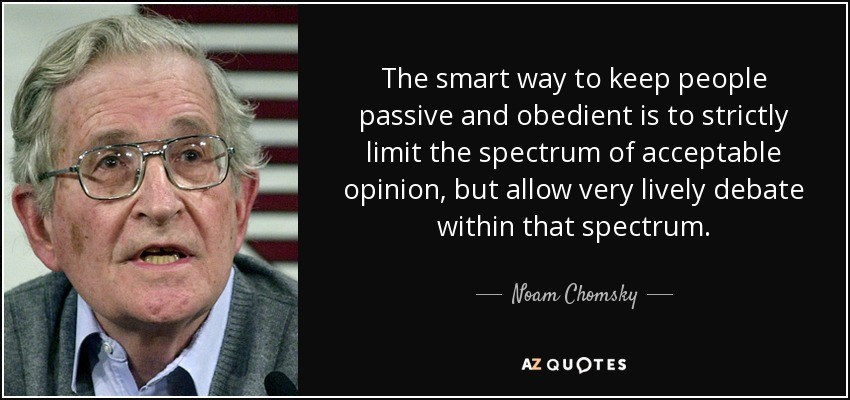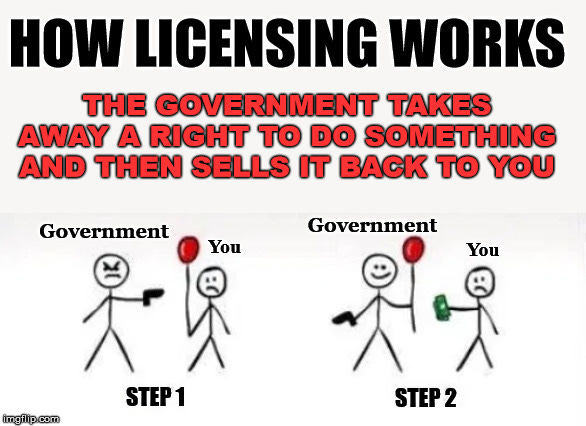I really, really, do not like Chomsky, but on this point, I must agree, as I know EXACTLY what he is talking about.
Here is the full quote:
“The smart way to keep people passive and obedient is to strictly limit the spectrum of acceptable opinion, but allow very lively debate within that spectrum – even encourage the more critical and dissident views. That gives people the sense that there’s free thinking going on, while all the time the presuppositions of the system are being reinforced by the limits put on the range of the debate.”
In the communist Hungary of my youth, I lived it. We had endless debates on ridiculous subjects. I was growing up with a weekly magazine printed as a broadsheet newspaper on every Friday. The name of the publication was (and still is) “Élet és Irodalom” = “Life and Literature” colloquially referred to as “ÉS” (and). Sometimes in the 70s it became a literary debate forum, where everybody who was anybody expressed their views on the issue de jour. When I picked up the paper on Fridays with religious regularity, it was that section I turned to first.
The longest debate I remember went on for a year and a half. The subject: cashew nuts. That decadent capitalist luxury item turned our world upside down. A small one hundred grams can cost the equivalent of about 8kg of bread or 8 litres of milk (that’s about 18 lb and 2 gallons for you, Americans).
It was expensive, but it was also something we never saw before. It wasn’t just a luxury, but also a curiosity. That stupid little novelty brought the class struggle to center stage.
Does the proletariat need this kind of luxury? What is the point dangling it in front of them? Can we allow some to have it while most of the people cannot afford it? If we cannot make it affordable for everybody, then we should not allow anybody to have it. Our whole existence and the meaning of communism was put into question. All communist countries were short of hard currencies, so the question was in a way a macro-economic one: why are we spending out limited supply of hard currency on luxury goods that the proletariat does not actually need? …Turning into the question: so, what does the proletariat need?
As I said, the debate raged for 18 months. The perfect example of the Chomsky quote above. A lively debate within a strictly limited spectrum of allowable opinion. Nobody dared to ask the most obvious questions or offer the most logical answers.
The point of these debates was to find the ONE correct answer to express the ‘Volonté general’. We should not waste our efforts on trying to figure out what every individual proletarian wants, but trust the decisions of our leaders and experts to sort out what we should all have and what none of us can.
Theoretically, of course. It was an ideal that was never reached.
I tried the cashew once, and decided that it was not worth the price.
And I decided so around the same time when I paid a week’s salary on the black market to have my own copy of the Beatles’ white album. Personal preferences cannot be turned off on demand.
The world I see around me today in Canada is the same spectacle. On steroids.
The communists of yore were trying to change human nature, but never tried to change nature itself to the extent we are doing it today.
In this postmodernist late stage of Marxism, the denial of reality is not a bug, but a feature.
The political circus
The political sphere, the mass media, public debates, legal disputes, an alarming portion of scientific debates and just about all philosophical discussions are designed to function as a well rehearsed and orchestrated performance. There is no real exchange, no compromise, no understanding or consideration for the ‘other side’ of the debate, only the presentation of the talking points of each side. No outcome is necessary in any of these exchanges. Pointed questions and real curiosity would only spoil the performance.
Each side may hope - not that their performance will persuade anybody from the other side – but that it will appeal to the side they represent. Functionally, it is no different from peacocks showing off their plumage.
We can see it in the fake ‘balanced news’; short form interviews; parliamentary question periods, congressional and senate hearings and unfortunately even formal debates.
In the political scene, it is so bad that most politician don’t even sit through them. They just go into the hearing, making their points for the media exposure, then leave. They have absolutely no interest in any sort of engagement. No acknowledgement or recognition of the other side and its concerns.
When it started, I watched every Munk debate. By the time they paywalled it, it was so very bad that it was an easy decision not to subscribe to it. The Chomsky rules applied even when it started, but at least some times there were almost real debates.
As I am writing this, I stopped here to listen to the latest Munk debate on artificial intelligence. I will comment on it a little further down.
For now, let me tell you about the article that prompted me to write this post:
Anthony Furey: Why the Jordan Peterson Ruling Should Concern Us All
It just ticked me off. Irrelevant blabber and no courage to ask a single relevant question.
Furrey is quoting the CPO’s ruling:
“Public statements that are demeaning, degrading, and unprofessional may cause harm, both to the people they are directed at, and to the impacted and other communities more broadly.”
Then says:
“This ruling is going to send a free speech chill to anyone in a regulated profession. “
What is questioned in the article is the scope of the organization’s authority.
What is debatable, is the lack of professionalism in the vagueness of the accusation.
What is debatable, are the actual merits of the statements in question.
What is debatable, is the monopolistic power, and indeed, the very legitimacy of the organization itself.
Questioning the need for licensing requirements is already outside the limits.
We could take just about any subject of contention in the public sphere and go through a similar analysis.
On the climate change/urgency/crisis/catastrophe/Armageddon, we cannot question the anthropogenic component (our responsibility) and the (practically) exclusive role of CO2
On gender identity and sex change, we cannot question reality, whether it is even possible, and we cannot discuss the potential harms and dangers of the procedures.
On Covid, and epidemics in general, we cannot question the integrity and benevolence of the medical profession or the expertise of the public health policy makers and propagandists.
On the imperialistic wars, we cannot question the overall benevolence of the narrative suggesting that we are fighting for democracy and ‘the rules based international order’.
On artificial intelligence, we cannot question the most basic assumptions of the claims (like the definitions used) and the ‘inescapable’ conclusion that it MUST be regulated by oversight organizations, preferably global ones.
The resolution of the Munk debate I mentioned above was:
“Be it resolved, AI research and development poses an existential threat.”
What the actual debate was about is whether we should be very, VERY afraid or just careful.
What was NOT disputed is the need for control and regulation.
What we are not allowed to discuss on any of the above subjects are:
The well-meaning benevolence of the proponents of control
The idea that control is always the right answer
The idea that our existing institutions are deeply (I may even say irreparably) corrupt
That there is an antihuman, deeply dangerous agenda behind all of them
Let’s suppose that I am wrong on the last point. If I am, we should be able to talk about it.
We should be able to break the frame of the Overton window.
Sometimes in the near future, I will share my ideas on how we could do that. If you do not want to miss it, please subscribe now, and let me know YOUR ideas on how it could be done in the comments
Further reading (more from me)
Communist boots, bread and health care
(on communist debates and Canadian Health-care)AI-23 - part #4 Reality
(All of the above with further links)






I like this final paragraph in Bruce Parady's essay on "Anatomy of the Administrative State."
"The King's absolute power served him, not his subjects. People who beleive the administrative state is different have been hoodwinked. By debating the niceties of policy, we quibble in the margins and surrender the battlefield. "Give us liberty," we might say, "or just do what you think best." Patrick Henry would not be impressed.